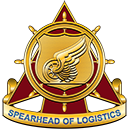Transportation Warrant Officers
The Professionals Moving The Army
The Army’s greatest challenge as it reorients its formations and training towards Large Scale Combat Operations (LSCO) is balancing risk between current and future readiness. The Multi-Domain Operational (MDO) environment demands clarification and solutions for Transportation challenges in order to maximize our combat effectiveness.
Transportation Corps (TC) Warrant Officers are critical to enhancing transportation capabilities from the strategic to tactical levels during competition, crisis, conflict, and change at a moment’s notice. Transportation Warrant Officers are broken down into two (2) primary categories: Mobility and Vessel.
Mobility Warrant Officers can synchronize rail, ground, air, and sea modes as well as provide transportation resources, planning, guidance, and time-phased force deployment predictability to Leaders and Commanders in the Regular Army, National Guard, and Army Reserve. Mobility Warrant Officers are experts in all facets of transportation within MDO-LSCO and to all Combatant Commanders in order to meet National Defense Strategy requirements. Their ability to leverage the mobilization process through multiple Mobilization Force Generation Installations and deployment from the Army’s Power Projection Platforms supports all movements at the “Speed of War.”
Vessel Warrant Officers, both Marine Deck Officer and Marine Engineering Officers, improve transportation readiness through the Command Deployment Discipline Program to support a global and regional focus with the ability to integrate modern maritime capabilities, such as the Maneuver Support Vessel (Light), to any specific mission and theater, enabling the rapid deployment, support, and re-positioning of Army forces anywhere in a theater of operations.
Transportation Warrant Officers are adapting and innovating to achieve capabilities overmatch that the Army needs to be LSCO-ready. They are the quiet professionals who work day-in and day-out to Move the Army wherever and whenever.
Warrant Officer Professional Military Education
Self-development. Warrant officers should devote time to self-development, which should include professional certifications, correspondence courses, institutional training, and civilian education. Junior warrant officers should utilize a professional reading program to broaden both their warfighting perspective and technical comprehension.
Desired experience. The junior warrant officer should focus on acquiring and refining their tactical and MOS- unique technical skills.
Education. After 2 years Time in Grade (TIG) from promotion to CW2, the warrant officer is eligible and should attend their MOS Warrant Officer Advanced Course (WOAC) no later than one (1) year after promotion to Chief Warrant Officer Three (CW3). Although not a requirement for promotion, all officers in the grade of Warrant Officer One (WO1) and Chief Warrant Officer (CW2) should set as a goal the completion of an associate’s degree.
Assignments.
- Marine Deck Officer (MOS 880A). Must complete requirements for A1 certification as outlined in AR 56–9, chapter 5. Individual must serve as a marine deck officer on board a class A1 or A2 vessel. They may also serve in Sustainment Commands, as Training Developers, or as MOS Instructors. WO1s or CW2s with no fewer than 4 years of marine deck officer service will complete the A2 Certification Course for SQI 2 certification.
- Marine Engineering Officer (MOS 881A). Must complete requirements for A1 certification as outlined in AR 56–9, chapter 5. Individual must serve as a marine engineering officer on board a class A1 or A2 vessel. WO1s or CW2s with no fewer than 4 years of marine deck/engineering officer service will complete the A2 Certification Course for SQI 2 certification.
- Mobility Warrant Officer (MOS 882A). Individual must serve as a mobility warrant officer at the detachment, battalion, or brigade/group level.
Development and broadening assignments. The CW2s can expect assignment to CW3 positions upon completion of the WOAC.
- Self-development. The CW2 should continue to acquire and refine their advanced tactical and technical MOS- unique skills. CW2 should refine their communication, presentation, and critical thinking skills.
- Desired experience. Successful completion of every duty assignment is vitally important and helps determine promotion potential.
Education. After 2 years time in grade (TIG) from promotion to Chief Warrant Officer Three (CW3), the warrant officer is eligible and should attend the Warrant Officer Intermediate Level Education (WOILE) and the WOILE follow-on course no later than 1 year after promotion to Chief Warrant Officer Four (CW4). Although not a requirement for promotion, all officers in the grade of CW3 should set as a goal the completion of a baccalaureate degree.
Assignments.
- Marine Deck Officer (MOS 880A). Must complete requirements for A2 certification as outlined in AR 56–9, chapter 5. Individual must serve as a marine deck officer on board a class A2 vessel or harbormaster detachment. They may also serve in ASCC;s as MOS Instructors, or as Training Developers.
- Marine Engineering Officer (MOS 881A). Must complete requirements for A2 certification as outlined in AR 56–9, chapter 5. Individual must serve as a marine engineering officer on board a class A2 vessel, unit vessel support officer, or battalion marine maintenance officer. They may also serve as MOS Instructors, Training Developers, or Marine Advisors to SATMO.
- Mobility Warrant Officer (MOS 882A). Individual must serve as a mobility warrant officer at the detachment, company, battalion, brigade/group, or Corps level. They may also serve as MOS Instructors.
Development and broadening assignments. All warrant officers in the grade of CW3 are master-level tactical and technical experts. CW3s should aggressively pursue broadening and Training With Industry (TWI) assignments. CW3s can expect assignment to CW4 positions upon completion of the WOILE.
- Self-development. CW3s should continue to acquire and refine their advanced tactical and technical MOS-unique skills. CW3 should refine their communication, presentation, and critical thinking skills.
- Desired experience. CW3s should provide leader development, mentorship, advice, and counsel to NCOs, Warrant Officers, and Officers. CW3s should provide advice and counsel to Commanders on technical and Warrant Officer issues. In addition, CW3s may serve in Table of Distribution of Allowances (TDA) units in supervisory, advisory, and training positions.
Education. Upon promotion to Chief Warrant Officer (CW4), the Warrant Officer is eligible and should attend Warrant Officer Senior Service Education (WOSSE) not later than one (1) year after promotion to Chief Warrant Officer Five (CW5). Although not a requirement for promotion, all officers in the grade of CW4 should set as a goal the completion of a baccalaureate degree or start of a graduate degree.
Assignments.
- Marine Deck Officer (MOS 880A). Must complete requirements for A2 certification as outlined in AR 56–9, chapter 5. Individual may serve as a marine deck officer on board a class A2 vessel or on staff as advisors at the brigade level or higher or as Training Developers.
- Marine Engineering Officer (MOS 881A). Must complete requirements for A2 certification as outlined in AR 56–9, chapter 5. Individual may serve as a marine engineering officer on board a class A2 vessel on staff as an advisor at the brigade level or higher, or as Training Developers, or Marine Advisors to SATMO.
- Mobility Warrant Officer (MOS 882A). Individual must serve as a mobility warrant officer at the battalion, brigade, Corps, or Army Service Component Command (ASCC) level. They may also serve as MOS Instructors or Training Developers.
Development and broadening assignments. CW4s are the senior-level tactical and technical experts who normally serve in Commander or supervisory, advisory, staff, or logistics roles.
- Self-development. CW4s should continue to acquire and refine their advanced tactical and technical MOS-unique skills. CW4s should master their communication, presentation, and critical thinking skills.
- Desired experience. CW4s should provide leader development, mentorship, advice, and counsel to NCOs, Warrant Officers, and Officers. CW4s should provide advice and counsel to Commanders on technical and Warrant Officer issues. In addition, CW4s may serve in Table of Distribution of Allowances (TDA) units in supervisory, advisory, and training positions.
Education (WOSSE) no later than 1 year after promotion to CW5. Although not a requirement for promotion, all officers in the grade of CW5 should set as a goal the completion of a graduate degree.
Assignments.
- Marine Deck Officer (MOS 880A). Must complete requirements for A2 certification as outlined in AR 56–9, chapter 5. Individual may serve in broadening, nominative, and advisory positions at the Brigade level or higher.
- Marine Engineering Officer (MOS 881A). Must complete requirements for A2 certification as outlined in AR 56–9, chapter 5. Individual may serve in broadening, nominative, and advisory positions at the ASCC or SCOE level.
- Mobility Warrant Officer (MOS 882A). Individual must serve as a mobility warrant officer at the brigade level or higher.
Development and broadening assignments. CW5s are master-level tactical and technical experts who serve in strategic supervisory, advisory, staff, logistics, and nominative MOS non-specific positions at brigade level and higher commands, Army Commands (ACOMs), Army Service Component Commands (ASCCs), and Direct Reporting Units (DRUs).
Warrant Officer Career Map
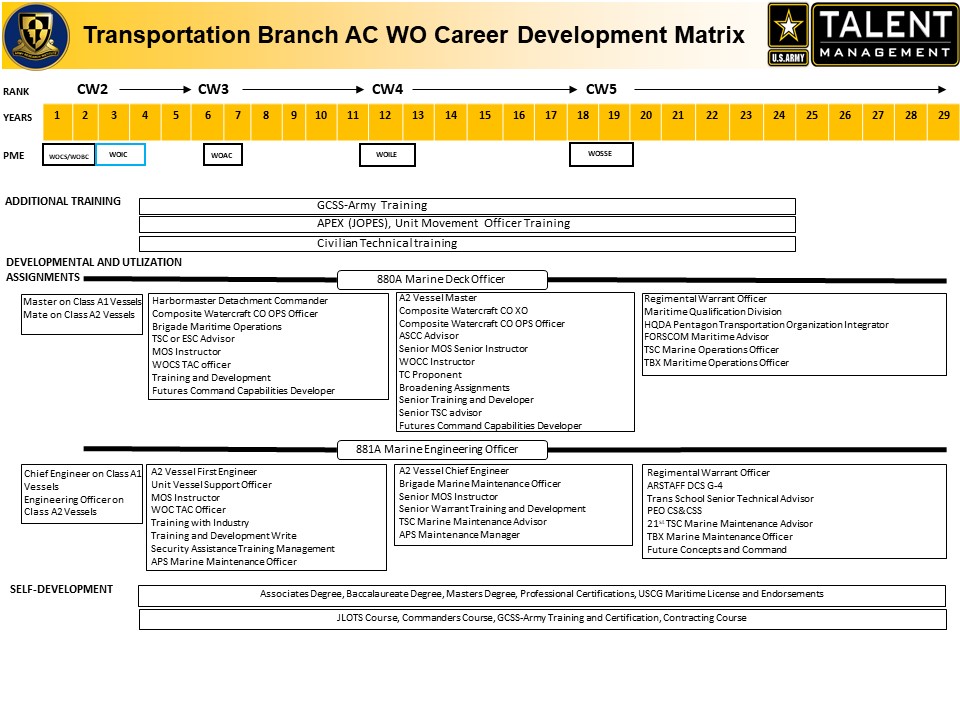
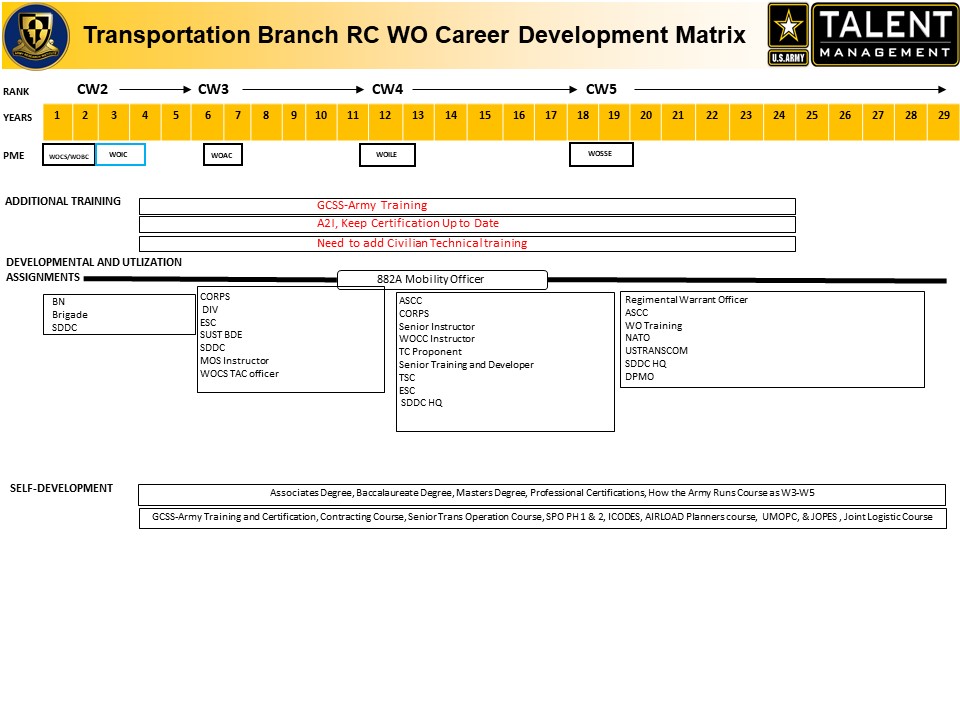

Transportation Warrant Officer Professional Development Model
The warrant officer development model is focused on the quality and range of technical expertise. Established gateways are required to ensure that the warrant officer progresses from the entry level of their career to the subject matter expert at the strategic level. Proper development will foster warrant officers that remain the experts in their functional skill, but are also extremely diverse in knowledge based education and experience. Leader development is a deliberate, continuous, progressive process, grounded in the Army Values that grows competent, committed, professional leaders of character. Leader development is achieved through the career-long synthesis of training, education, and experiences acquired through opportunities in the in the institutional, operational, and self-development domains, supported by peer and developmental relationships.
Transportation Warrant Officer Training With Industry (TWI)
The Transportation Corps' objective in sponsoring TWI is to expose Soldiers to civilian corporate structure, technology, and methodology in business, strategy, policy, and management in the areas of rail, air, marine shipping, trucking and freight management, package delivery and distribution, and government contracting. Knowledge and skills learned during a TWI tour will be applied throughout the Soldiers’ career to contribute to the development of transportation systems, structure, procedures, and doctrine.
Warrant Officers participate in specific industries depending on the year and MOS. Every year, Marine Deck Officers (880A), Marine Engineer Officer (881A), and Mobility Warrant Officers (882A) alternate participation.
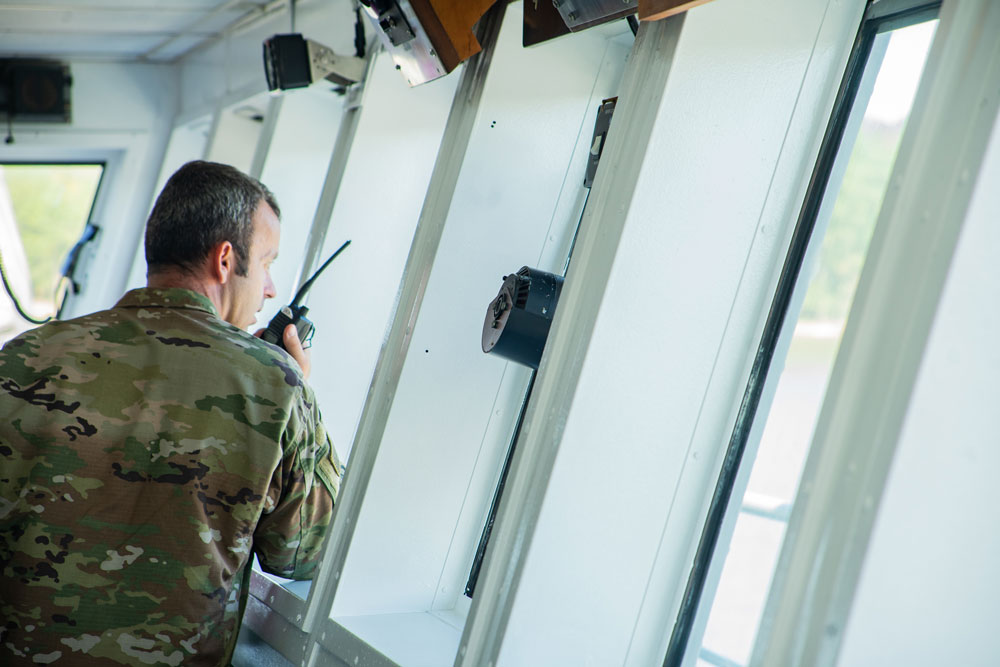
880A TWI: Crowley Maritime Services
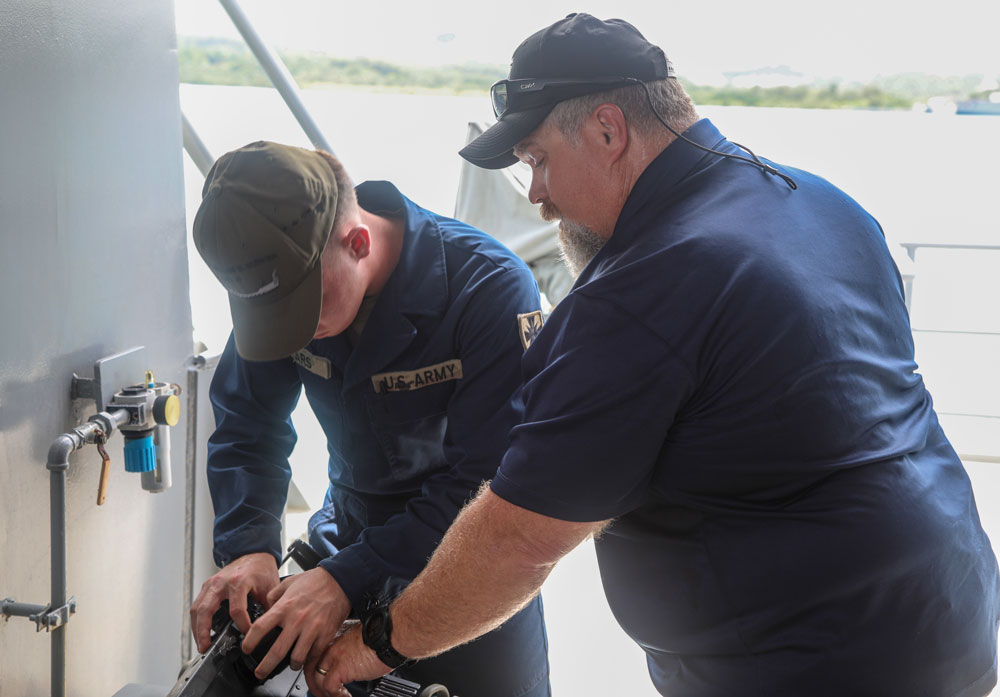
881A TWI: Caterpiller
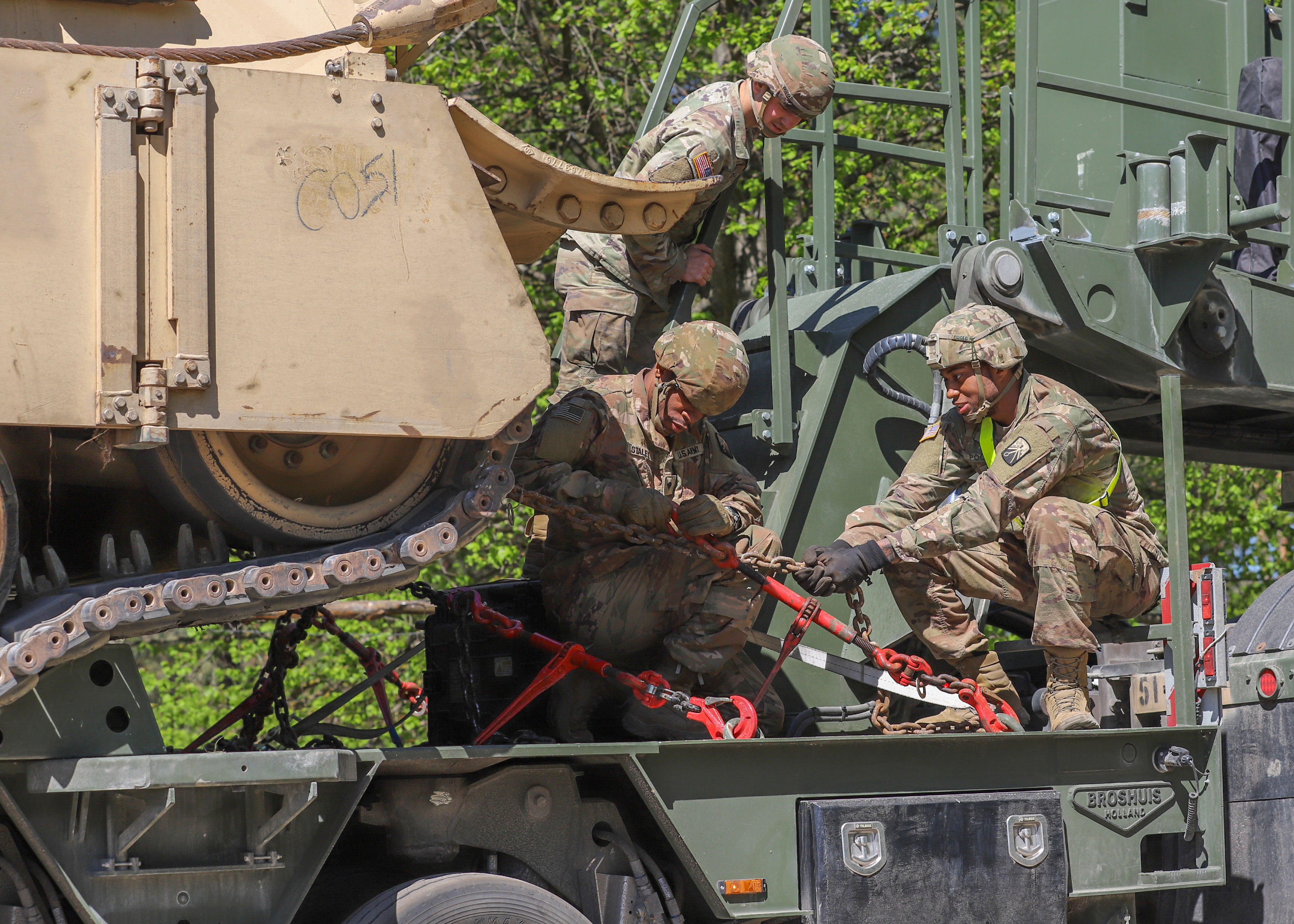
882A TWI:
- Must be on active duty and serving in a Regular Army (RA) or Voluntary Indefinite Status.
- Must express specific interest in the TWI Program by submitting a formal application ATZF-OCT-P
- Must agree in writing to fulfill the service obligation incurred by acceptance of training.
- Must have a SECRET clearance unless a higher clearance is required.
- Must have a military performance record that demonstrates potential for a highly successful career.
- Must be branch qualified at company grade level (commissioned officers only).
- Warrant Officers may apply at any time using DA Form 1618-R (Application for Detail as a Student at a Civilian Educational Institution or at Training With Industry).
- The applicant must send the form (in duplicate) through their battalion commander to the Human Resources Command (HRC) Transportation Corps Assignment Officer. The chain of command should endorse the application, which should include a statement from the commander concerning the applicant's abilities, attitude, initiative, and aptitude towards working in the industry desired.
- Meet or exceed established training objectives.
- Meet all required actions by suspense dates.
- Submit required reports.
- Establish or maintain an on-site continuity book as outlined.
- Write at least one article for the Transportation Corps’ The Spearhead Magazine.
Additional Opportunities
Industry Based Broadening — Institute for Defense and Business (IDB)
Purpose:The focus of the IB2 seminar is Enterprise Resource Planning systems (ERPs) specifically the use of ERPs as a decision-making tool to improve readiness, lethality, and reduce costs for the Army.
Concept: Strategic seminar for officers, warrant officers, senior NCOs, and DA Civilians hosted by the Institute for Defense and Business (IDB) in Chapel Hill, NC.
- 3-week seminar-style instruction
- Seminar funding provided by CASCOM
- Benchmark with Cisco, FedEx, GE-Aviation, Caterpillar, etc.
| Foundation | Benchmark | Output |
|---|---|---|
| Week 1 | Week 2 | Week 3 |
| Business/ERP Integration, Intelligence, & Analytics | Industry Benchmarking | Practical Application Exercises |
| Industry/Academic Research | Business Intelligence & Data Analytics | Final Project Development |
| Problem Statement Analysis, Development, & Refinement | Industry/Academic Research | Project Presentation |
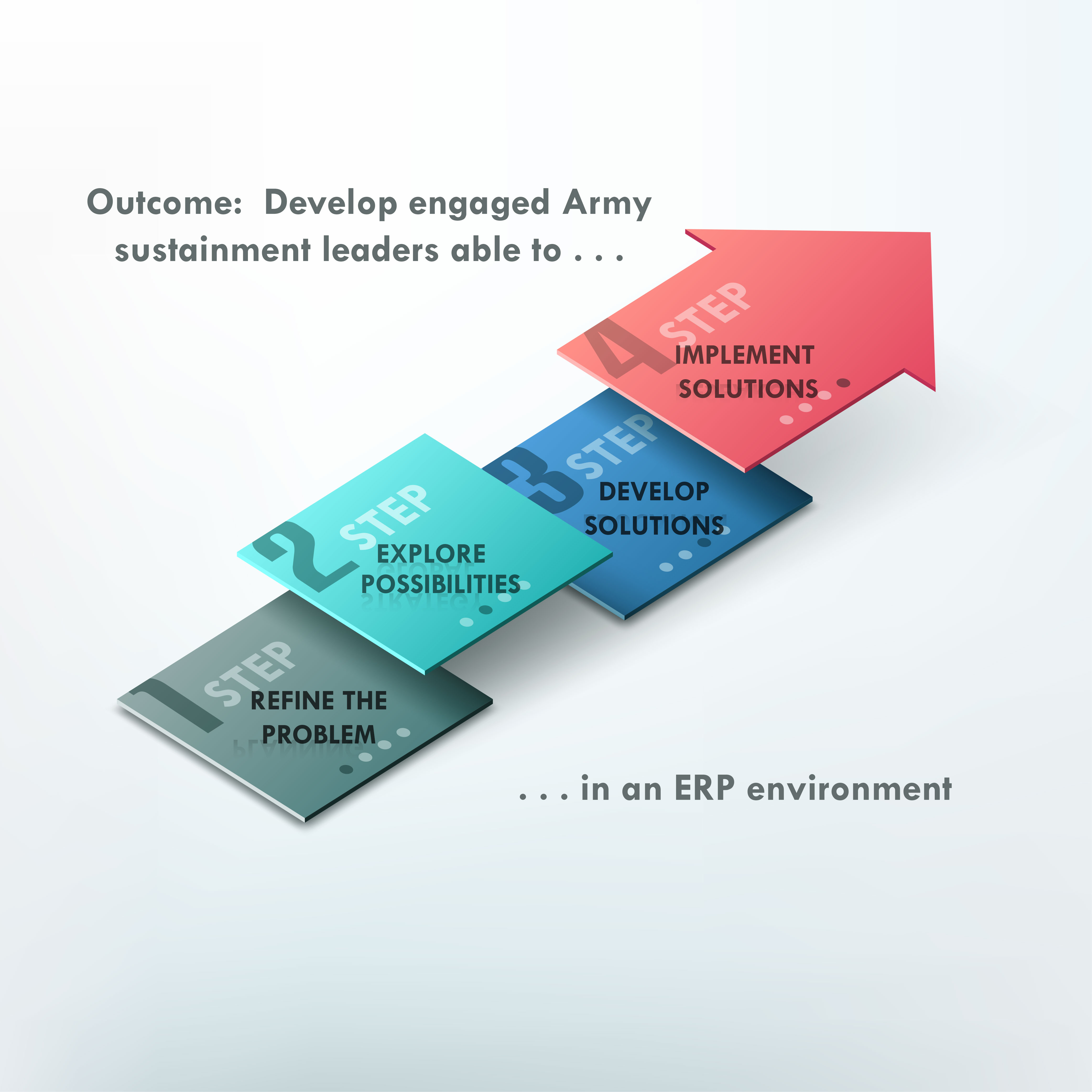
Contact the Logistics Branch Prononency Office. usarmy.lee.tradoc.mbx.leee-logistics-branch-proponency-office@army.mil
